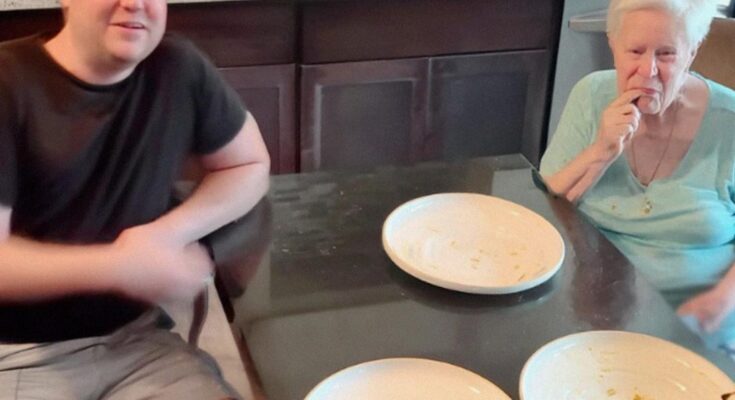Three months after baby number four, I was running on fumes and crumbs. Sleep was a rumor. A hot meal was a myth. And somehow my mother-in-law decided my kitchen was her personal all-access buffet.
It started the morning she let herself in—no knock, no text—drained the two cups of coffee I’d made to survive the day, and tucked my lunch under her arm like a party favor. “You can always make more,” she chirped, rinsed her mug, and breezed out the door with a “Thanks for the food!”
I told myself it was a one-off. It wasn’t. She lived two blocks away and treated “popping in” like a sport. If I put a plate in the fridge so I could nurse the baby and come back to eat, I’d return to find her chewing through it with a shrug. “Leftovers,” she’d say. “Label things better.”
What stung wasn’t just the food; it was that she never lifted a finger to help. No holding the baby so I could eat with two hands, no “What can I do?” Just raiding and running.
I told my husband. “Your mother is eating my meals. I’m going hungry.”
“I’ll talk to her,” he said without looking up. Then: “Relax.”
Nothing changed. I asked her directly, as calmly as sleep deprivation allows. “Please stop helping yourself. If I offer, fine. Otherwise, leave it.”
Hand to chest, eyes wide, all wounded innocence. “I had no idea it bothered you that much.” She stayed away for a week. Then came the pizza night.
The baby had gotten shots and cried if I put her down. I still managed four homemade pizzas—one for each kid, one for me, one for my husband, one for his mother because she’d texted she was coming. I boxed them, called, “Dinner’s ready! Your boxes are labeled!” and went upstairs to bounce the baby to sleep.
Forty-five minutes later, starving, I came down to a counter littered with crumbs and four empty boxes. Laughter drifted from the living room. My husband and his mother were sprawled on the couch, polishing off the last slices.
“You couldn’t leave me a single piece?” My voice cracked.
“Honest mistake,” he said, mouth full.
“I didn’t see names,” she added delicately, dabbing her lips.
My thirteen-year-old hovered in the doorway. “Mom, I saved you three slices. Put them on a plate on the counter. Did you get it?”
I looked at the naked plate. Then at her. She actually shrugged. “It was just sitting there.”
My kid’s face fell. He apologized to me. A child apologizing for trying to make sure his mother ate while two adults defended themselves with “relax.”
Something in me snapped. “Every time you come here, I go without food because you take it. And you—” I looked at my husband “—sit there and laugh.”
She grabbed her purse. “I don’t have to take this abuse!”
“Then don’t come back,” I said, shaking. He stared like I’d sprouted horns. I told him to get out of my sight before I said something I couldn’t un-say. He left. I stood in the kitchen with a growling stomach and made myself a promise: things were going to change.
The next morning, I bought neon labels and a couple of cheap cameras. I meal-prepped like a drill sergeant. Every container had a name in letters you could read from the moon. The kids’ lunches were stacked neatly. Mine, too. My husband’s and his mother’s? Empty boxes. Enjoy the symbolism.
I mounted one camera facing the fridge and one covering the kitchen. That evening, he opened the fridge and frowned. “Where’s my dinner?”
“You’re not a child,” I said, folding laundry. “Cook. Or maybe Mommy can help when she drops by.”
He huffed and ordered takeout. The next day, like clockwork, she let herself in. From the top of the stairs I watched her clock the labels, go red, and mutter about “ridiculous boundaries.” Then she did exactly what I knew she’d do: took the container with my name on it, sat, and dug in.
I came down halfway through. “Oh, Wendy. You’re eating my lunch.”
“It was just sitting there,” she said, waving me off.
Consequences arrived shortly after. Let’s just say she spent the next hour getting intimately reacquainted with our hallway bathroom and left green-faced, hissing that it “wasn’t over.”
My husband came home as she staggered out. “What did you do?” he demanded.
“I respected my own label,” I said. “Maybe try it sometime.”
That night, while he was ferrying kids to practice, I uploaded the kitchen footage to my Facebook—no commentary beyond a caption: “When someone keeps taking your food after you’ve asked them to stop, labels are your friend.” It showed her opening the fridge, reading names, fuming, and choosing mine anyway.
My notifications blew up. Friends, neighbors, even my mother: “Good for you.” “She needed that.” “Boundaries matter.” By morning, her phone was lighting up with “Yikes, Wendy” texts.
She called my husband, shrieking. He hung up and told me she wanted an apology—for humiliating her and “poisoning” her. I put down the mug of coffee I was finally drinking hot. “I didn’t poison anyone. I labeled my food in my house. She chose to ignore that. These are consequences.”
He opened his mouth, then shut it. For once, silence.
Two weeks later, the house feels different. She knocks now. She brings her own snacks. She eats them in her car. He’s learned how to boil pasta and make a passable grilled cheese. The kids know their food will be there when they come back for it. So do I.
Here’s what I learned: you can ask nicely, explain, plead—but some people only understand a boundary when it has teeth. I wish we lived in a world where “please don’t take my food” was enough. We don’t. Sometimes the only way to stop being stepped on is to stop lying down.
Was it harsh? Maybe. Was it wrong? No. You can’t light yourself on fire to keep other people warm, not when you’re already down to embers. I’d given birth. I was starving. I was done.
Now, everything in our fridge wears a name. Respect isn’t optional anymore. And in this house, karma is served with clear labels, a locked bathroom, and the unmistakable taste of “not yours.”



